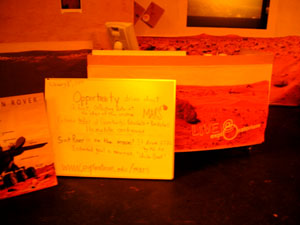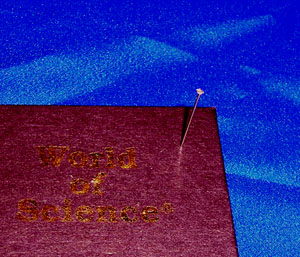

Wearing "Blue Blocker" sunglasses gives you a sense of what it might look like on Mars.
See me, feel me, touch me heal me
by Dr. Paul Doherty and Dr. Eric Wegryn (a Mars Scientist)
Music from the Rock Opera Tommy, "See me, feel me, touch me..."
What would happen if you stepped naked onto the surface of Mars. All gas inside you would come out through every orifice in your body. You would remain conscious for 10 to 15 seconds. Your ears would "pop" as they adjusted to Martian pressure, so that you can hear. After 15 seconds your blood would boil.
Hot Dog in a vacuum chamber?
See
Seeing on Mars, the air is a bit hazy, which obscures our view of the stars, but there is no light pollution. (We've never photographed earth from the surface of Mars.)
During the day the dusty sky scatters salmon-colored light. Everything is illuminated by reddish light, to get the idea what this would be like wear some "Blue-blocker" sunglasses.


Wearing "Blue Blocker" sunglasses gives you a sense of what it
might look like on Mars.
Mars appears reddish because the dust contains iron oxides, rust. Probably similar to the minerals known as limonite.
The dust scatters red at high angles and blue at smaller angles. This means that at sunset the sky around the sun is bluish, since the light there is scattered at small angles, and the sky far from the sun is reddish, or salmon, colored.
Early observers of Mars saw a wave of green spread from the polar caps toward the equator every spring. This was an illusion produced by the human eye and brain. On Mars, gray dust was blowing away from the poles into a region of reddish dust. When gray light is viewed in a surrounding field of reddish material it can appear greenish.
We must understand human perception to understand what we "see."
The Moons of Mars are small, about the size of San Francisco, so they are bright against the stars but don't provide much light to the surface.
Hear
Hearing on Mars, the thin air does carry sound, just not as well as the thick air of earth.
In fact with the air density 100 times lower on Mars the sound intensity carried to your ear is 100 times less. The ear is a logarithmic detector however so the sound level decreases by 20 dB.
Demo: This is the same decrease in sound produced by covering your ears with your hands.
Demo, put a boombox into a vacuum chamber at the Water Freezer exhibit then listen at Earth and Mars pressures.
Smell
Smelling, Mars would smell like CO2
Demo a fish tank with dry ice, waft the CO2 from the dry ice toward your nose to smell Mars.
Or put dry ice into a squirt bottle and squirt CO2 toward your nose and tongue.
Taste
Taste Mars, put your tongue into the tank of CO2 or put dry ice into a squirt bottle and squirt some CO2 onto your tongue. Tangy!
Feel
Feel Mars,

Demo cool a sandstone rock to dry ice temperatures and allow people to touch it.
Don't put your tongue onto metal pipes on Mars.
Mars is also very dry, like the air in the Antarctic Dry Valleys or the Atacama Desert on Earth.
Gravity would be 1/3 less on Mars.
But you would have the same mass, The astronauts on the moon adapted very quickly to this combination, but they did stumble and almost fall a few times.
Demo use the swingset and a bathroom scale to show weight on Mars.
UV would be over 100 times as intense on Mars since there is no ozone layer.
I would sunburn in 15 seconds of exposure!
Mount the mars grains onto holders.
Magnetic sense
Animals with a magnetic sense would not sense Mars since there is no planetary magnetic field.
|
Scientific Explorations with Paul Doherty |
|
25 Dec 2003 |